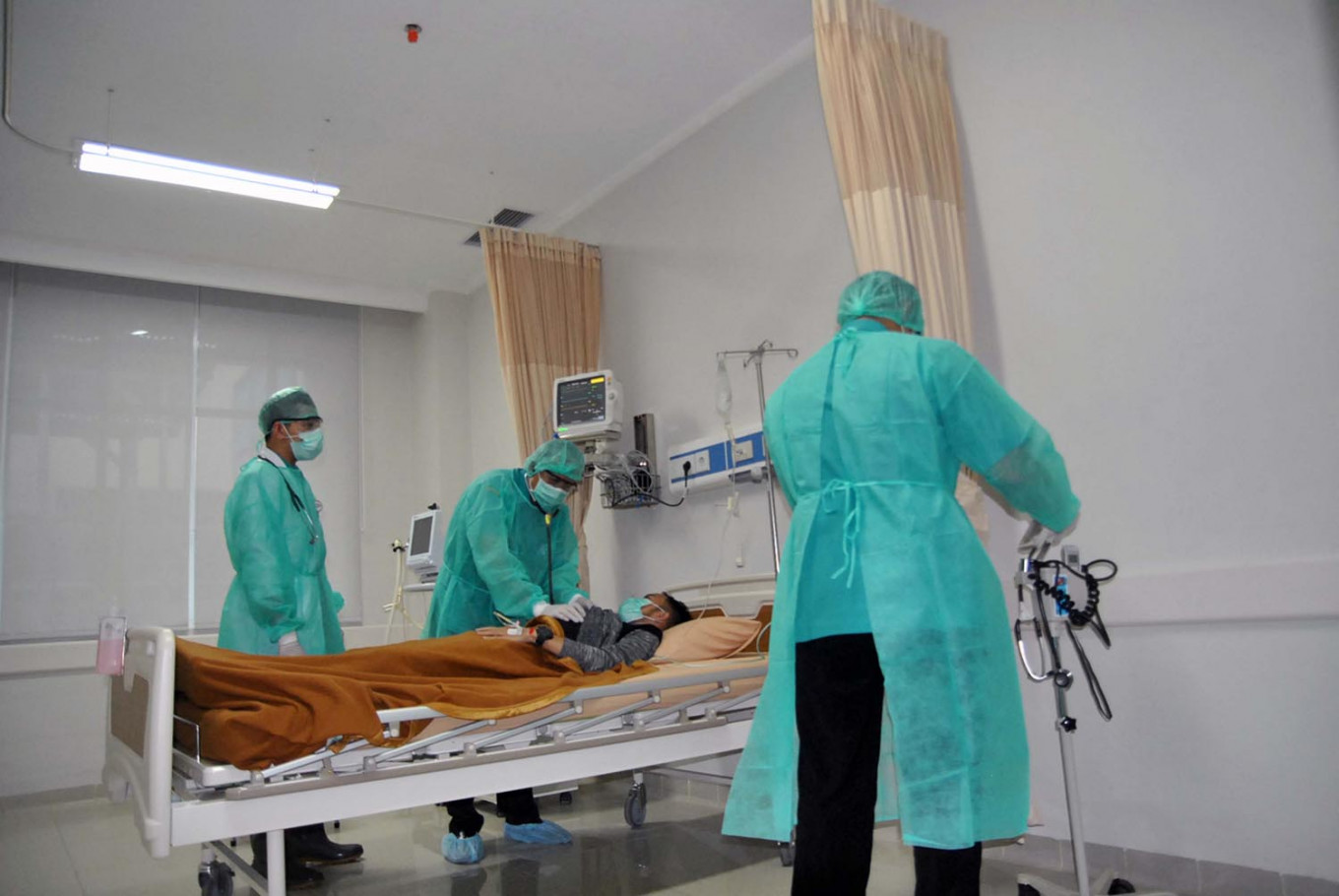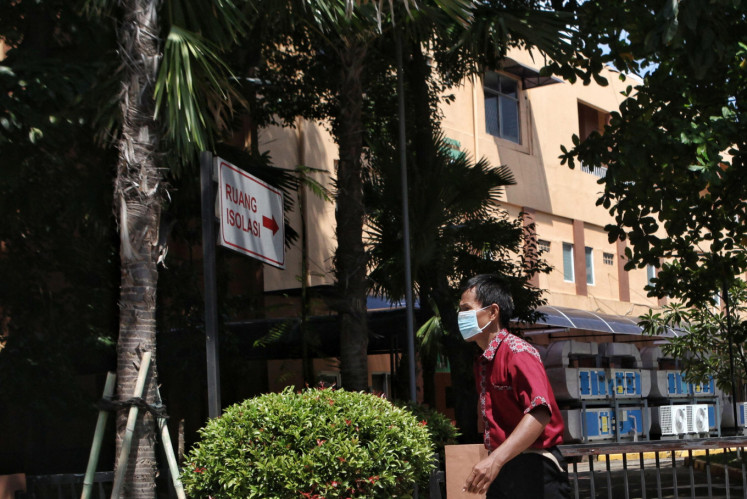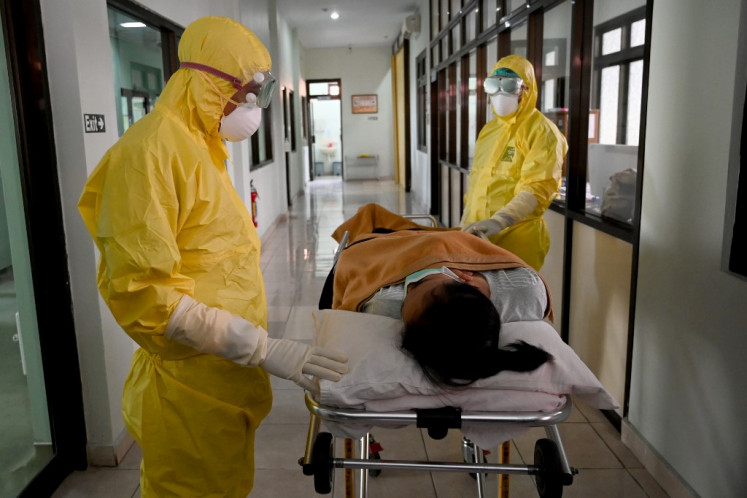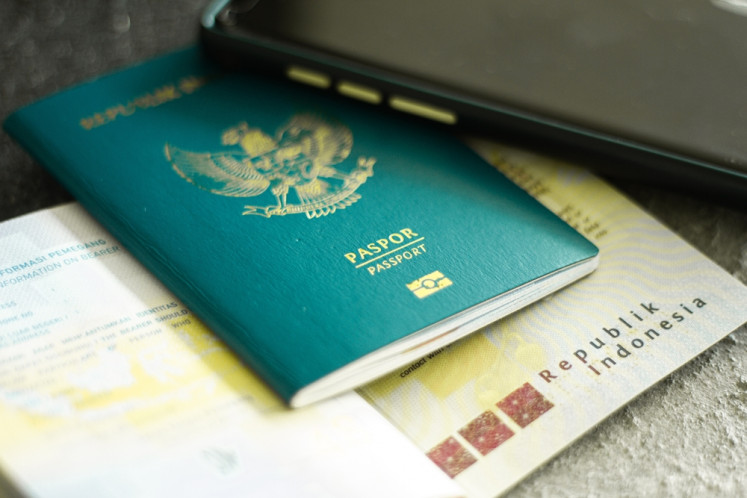'If not us, who else will do it?': Sweat and tears of Indonesia's COVID-19 nurses, doctors
Doctors and nurses, especially in cities reporting suspected and confirmed cases, are working longer hours and are worried about the health of themselves and family members.
Change Size
 Medical workers treat a patient in Bogor General Hospital in West Java during a simulation in an isolation room on March 4. (Antara/Arif Firmansyah)
Medical workers treat a patient in Bogor General Hospital in West Java during a simulation in an isolation room on March 4. (Antara/Arif Firmansyah)
O
n a Friday night several nurses were seen sitting on the floor of an intensive care unit (ICU) in a hospital in Jakarta. Near the ICU were the isolation rooms.
Breathing behind a N-95 mask inside a hazmat suit for hours is hard but it is their only options as it is they who spend most time with patients suffering from the highly contagious coronavirus disease COVID-19.
“It takes 20 minutes simply to put on a hazmat suit so after preparing the isolation room for the patient we decide to just wait in the hall,” one of the nurses, Laras, not her real name, explained.
She said that since the beginning of March, when President Joko "Jokowi" Widodo announced the first two confirmed cases of COVID-19, she had seen more and more patients with COVID-19 going through the ICU ward and nurses were working harder and more cautiously than on their normal days. She said they rested “only for a quick bite and then work again”.

Doctors and nurses, especially in cities reporting suspected and confirmed cases, are working longer hours and are worried about the health of themselves and family members. On March 12, a COVID-19 patient, a 37-year-old woman, died in Sulianti Saroso Hospital. The government did not acknowledge that she was actually a nurse. The Jakarta Post's sources, however, have confirmed that the patient was a nurse who had contact with a COVID-19 patient in another hospital in Jakarta.
President Jokowi, in his speech on Thursday, a week after the nurse died in Jakarta, personally thanked nurses and doctors. "I give my thanks and highest appreciation to doctors, nurses and all hospital workers who are working hard, full of dedication in serving the patients who are infected by COVID-19," he said.
More than checking on their condition, assisting the doctors and ensuring that the patients get proper medication Laras said that the patients in the isolation thanked the nurses for also just being there as friends to talk to as they had been quarantined for days, some for weeks, in the isolation room with no contact with other humans.
“I always make sure that I talk with them. It is hard for them being sick, locked up like that and away from their family. Nurses are the ones who spend most of the time with them so we try our best to talk with them during our visit, about anything,” Laras, who requested anonymity for professional reasons, told the Post on Thursday.
Laras who has been working as a nurse for years said that she had experienced two bad outbreaks during her career: Severe Acute Respiratory Syndrome (SARS) and bird flu in the early 2000s.
COVID-19 was the worst, she said, in particular because the government did not make it clear to the medical workers whether they were treating a positive patient or not.
“During the bird flu I knew exactly which patients were confirmed positive with the disease. The data was always there and it really helped us. But now there is no data. We do not really know who the suspected COVID-19 patients are or who are the positive ones. It makes me really worried. So as a result, we are being asked to treat all of them in the ICU room as patients who have tested positive for COVID-19,” Laras said.
“Every time I put on my hazmat suit and prepare myself to enter the isolation room and the ICU room I always wonder ‘Am I doing it right, am I wearing the goggles right. Is the suit fitting properly, am I really protected?’” Laras said.

Two nurses in Sanglah Hospital in Bali have been placed in isolation after having contact with a COVID-19 patient.
Going home from work is another story. Laras said she had told some relatives that she would not visit their houses in the near future.
“I’m worried that I might bring the virus. Especially when most cases are asymptomatic, " she said.
Laras said nurses who had family were worried every single day that they would spread the virus to their spouses and children. Some of them are sleeping in different rooms from other family members throughout the entire outbreak.
Long hours, lack of protection
In a state-owned hospital in Tasikmalaya, West Java, medical personnel have been forced to wear disposable plastic raincoats when transporting patients under observation for COVID-19.
The Saiful Anwar Hospital (RSSA) in Malang, East Java, even had to ask their local tailor to make their own hazmat suits. The hospital has treated two positive COVID-19 patients. One of them died recently.
"Our hospital has had a hard time in providing hazmat and protective equipment for our medical workers,” Syaifulah Asmiragani said on Wednesday
To solve the problems Syaifulah said the hospital decided to reduce other medical procedures such as surgery.
“The hazmat and protective equipment will be prioritized for urgent cases only, such as COVID-19,” he said.
Ungki Agus Setiawan, a doctor and a member of the medical team handling COVID-19 patients at RSSA Malang, said that even his 10 years’ experience of working with infectious diseases could not prepare him for the pandemic.
“This is a new disease, and it’s highly contagious, and there is still no medicine or vaccine for this. Of course, we are afraid, we are also humans. But this is all for the health and safety of the community. We work like soldiers with high discipline to reduce any mistakes, but we also have to be ready for all the risks,” Ungki told the media on Wednesday.
When asked about his family Ungki went silent for a while, his eyes glistened with tears, before he replied.
“The point is we are still fighting to treat COVID-19 patients until they get healthy. If not us, who else will do it?” he said.
At Graha Kedoya Hospital in West Jakarta 80-year-old lung specialist Handoko Gunawan’s was reported to be ill after working until 3 a.m. and tending to COVID-19-positive patients. His family, however, have told the press that Handoko is getting better and has tested negative for COVID-19.
'Protect them'
The spokesperson for Adam Malik General Hospital in Medan, North Sumatra, Rosario Dorothy Simanjuntak, said that hundreds of medical personnel in the hospital were dedicated to COVID-19 given the heavy volume of patients related to the novel coronavirus. She said sometimes the team members had little time to rest. "They work overtime due to the high number of COVID-19 patients in this hospital," she said on Thursday. As of Thursday, the hospital had treated 10 patients related to COVID-19. On Wednesday, they reported the first death of a confirmed coronavirus patient.
The Indonesian Nurses Association (PPNI) chairman, Harif Fadhillah, said that nurses across the nation reported to him that they were worried that they will not be protected when they treat patients with COVID-19.
Harif said that while the standard procedure decreed that medical workers had to protect themselves using hazmat suits, gloves, goggles and masks when they have contact with COVID-19 patients, implementation in the field was not that easy.
“How can they protect themselves if they don’t have enough equipment? I haven’t heard complaints from nurses in the referral hospitals but nurses from nonreferral hospitals have reported them. Not all COVID-19 patients went directly to referral hospitals, they sometimes visit other health facilities too, and nurses should be protected too,” Harif told the Post on Thursday.
Meanwhile, Nurul Nadia, a public health expert from the Center for Indonesia's Strategic Development Initiatives (CISDI), said that as the nation now faced community transmission of COVID-19 it was important for the government to protect all medical workers, not only those in referral hospitals.
“The government needs to provide all medical workers in all health facilities with detailed standard procedures on how to handle patients, because they don’t know whether the patients that come to them are infected with coronavirus or not. The protocol for medical workers is still too general,” she said.
Executive director of Amnesty International Indonesia Usman Hamid has also urged the government to be more serious in protecting medical workers. Usman said the Indonesian Doctors Association (IDI) had reported a lack of protective equipment, especially hazmat suits, for medical workers amid the pandemic.
“As the front-line staff in handling this COVID-19, medical workers are the most vulnerable group because they are exposed to patients in health facilities. The fact that that many of them have been infected is proof that the government is not protecting them well. This is dangerous for medical workers, patients, their families, relatives and the community. The government must publish protocols on protection for medical workers,” Usman said in a release on Wednesday.
Apriadi Gunawan contributed to this story from Medan, North Sumatra









